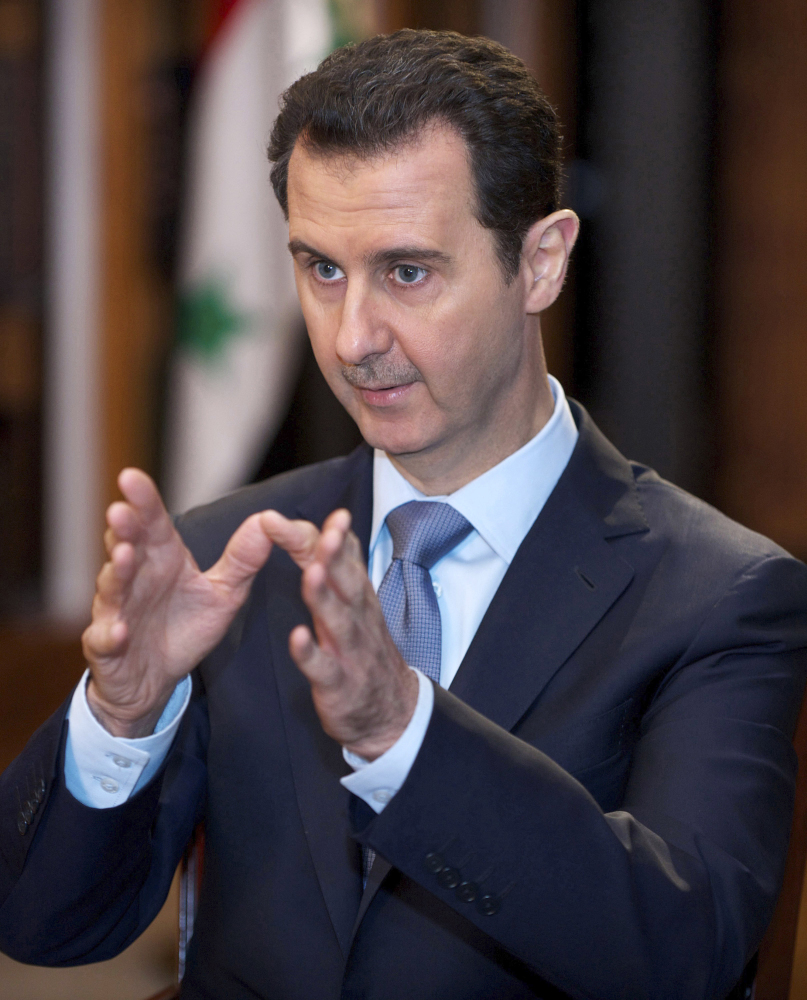BEIRUT — Syrian President Bashar Assad said Monday he would seek re-election in balloting scheduled for June, the government announced, confirming a decision that had been widely expected.
Official state media reported that Syrians “took out to the streets” across the country to express support for the electoral process.
The armed opposition and its foreign allies, including the United States, have denounced the planned election as illegitimate and a “parody” of democracy.
Few doubt the election will result in a victory for Assad, who will be seeking his third seven-year term. He enjoys an outsize power of incumbency in a country led for more than four decades by him and his late father, Hafez Assad.
Carrying out an election in the war-ravaged nation will be a massive logistical challenge. Vast stretches of territory, especially in the north and east, remain out of the government’s hands. Even pro-government strongholds, such as central Damascus, are subject to frequent opposition mortar attacks.
But with Assad’s term ending in July, authorities decided to go ahead with the national balloting June 3. Officials wanted to avoid a vacuum in leadership and sought to rally support for the president and project an image of strength to friends and enemies in Syria and abroad.
The official media are heralding the vote as taking place “against a background of large-scale victories made by the army … against the foreign-backed terrorist groups.”
In recent months, the government has made steady gains in and around Damascus, the capital, in central Syria and elsewhere against armed rebels, whom the government routinely refers to as terrorists. But even pro-government advocates agree that the war is far from over.
For the first time, the president will be directly elected in a multiparty election, according to constitutional reforms enacted in 2012. Several candidates from opposition parties have announced their intentions to run. Few give them much chance against Assad.
In the buildup to the June election, officials have been organizing a series of pro-Assad rallies in government strongholds across the country. Images of the president are ubiquitous at military checkpoints and government offices and on walls and buildings throughout government-held areas.
Still, Assad is an extremely polarizing figure: His supporters laud him as the man who saved the nation from terrorism and rule by Islamic zealots. Critics call him a despot who led his country to ruin.
The war broke out more than three years ago after a military crackdown on antigovernment protests. The opposition says the uprising was a response to repression. The government says the protesters’ grievances were hijacked by armed terrorists funded from abroad.
Since then, more than 100,000 people have been killed, millions forced from their homes and entire towns and neighborhoods have been largely reduced to rubble. Meantime, the war has become a proxy conflict for outside powers in the heart of the Middle East.
Backing Assad’s government is Russia, Iran and the Lebanon-based Hezbollah militant group.
The fractured rebel forces are bankrolled by Saudi Arabia, the United States and other allies. Various al-Qaida-linked forces are among the most powerful rebel factions.
Send questions/comments to the editors.



Success. Please wait for the page to reload. If the page does not reload within 5 seconds, please refresh the page.
Enter your email and password to access comments.
Hi, to comment on stories you must . This profile is in addition to your subscription and website login.
Already have a commenting profile? .
Invalid username/password.
Please check your email to confirm and complete your registration.
Only subscribers are eligible to post comments. Please subscribe or login first for digital access. Here’s why.
Use the form below to reset your password. When you've submitted your account email, we will send an email with a reset code.